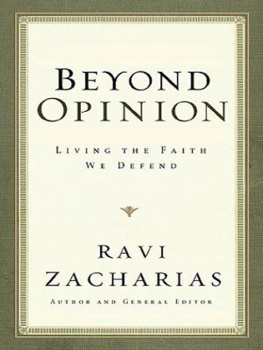Austen Ivereigh - How to Defend the Faith without Raising your Voice
Here you can read online Austen Ivereigh - How to Defend the Faith without Raising your Voice full text of the book (entire story) in english for free. Download pdf and epub, get meaning, cover and reviews about this ebook. year: 0, genre: Religion. Description of the work, (preface) as well as reviews are available. Best literature library LitArk.com created for fans of good reading and offers a wide selection of genres:
Romance novel
Science fiction
Adventure
Detective
Science
History
Home and family
Prose
Art
Politics
Computer
Non-fiction
Religion
Business
Children
Humor
Choose a favorite category and find really read worthwhile books. Enjoy immersion in the world of imagination, feel the emotions of the characters or learn something new for yourself, make an fascinating discovery.

- Book:How to Defend the Faith without Raising your Voice
- Author:
- Genre:
- Year:0
- Rating:4 / 5
- Favourites:Add to favourites
- Your mark:
- 80
- 1
- 2
- 3
- 4
- 5
How to Defend the Faith without Raising your Voice: summary, description and annotation
We offer to read an annotation, description, summary or preface (depends on what the author of the book "How to Defend the Faith without Raising your Voice" wrote himself). If you haven't found the necessary information about the book — write in the comments, we will try to find it.
How to Defend the Faith without Raising your Voice — read online for free the complete book (whole text) full work
Below is the text of the book, divided by pages. System saving the place of the last page read, allows you to conveniently read the book "How to Defend the Faith without Raising your Voice" online for free, without having to search again every time where you left off. Put a bookmark, and you can go to the page where you finished reading at any time.
Font size:
Interval:
Bookmark:

Without Raising Your Voice
Civil Responses to Catholic Hot-Button Issues
Our Sunday Visitor Publishing Division
Our Sunday Visitor, Inc.
Huntington, Indiana 46750
Every reasonable effort has been made to determine copyright holders of excerpted materials and to secure permissions as needed. If any copyrighted materials have been inadvertently used in this work without proper credit being given in one form or another, please notify Our Sunday Visitor in writing so that future printings of this work may be corrected accordingly.
Copyright 2012 by Austen Ivereigh. Published 2012
17 16 15 14 13 12 1 2 34 5 67 89
All rights reserved. With the exception of short excerpts for critical reviews, no part of this work may be reproduced or transmitted in any form or by any means whatsoever without permission in writing from the publisher. Contact: Our Sunday Visitor Publishing Division, Our Sunday Visitor, Inc., 200 Noll Plaza, Huntington, IN 46750; 1-800-348-2440; .
ISBN: 978-1-61278-538-7 (Inventory No.T1222)
eISBN: 978-1-61278-224-9
LCCN: 2012932796
Cover design by Lindsey Riesen
Cover art: Shutterstock
Interior design by Dianne Nelson
Printed in the United States of America
We know how it feels, finding yourself suddenly appointed the spokesman for the Catholic Church while youre standing at a photocopier, swigging a drink at the bar, or when a group of folks suddenly freezes, and all eyes fix on you.
Youre a Catholic, arent you? someone says.
Urn, yes, you confess, looking up nervously at what now seems to resemble a lynch mob.
The pope has been reported as saying something totally outrageous. Or the issue of AIDS and condoms has come up. Or the discussion has turned to gay marriage. And here you are, called on to defend the Catholic Church by virtue of your baptism, feeling as equipped for that task as Daniel in the den of lions.
Go on, they seem to say, but dont actually put it that way.Justify what the Church teaches!
Scrabbling together a few thoughts, you put up a valiant defense, and people nod sympathetically. You contextualize, point out x and y, make a few observations they hadnt thought of, bring a little perspective into the question. The mob dissolves; people smile. Theyre not persuaded, but they dont want you to feel uncomfortable.
Or it didnt happen that way at all? Perhaps what happened was you got a little flustered and said a whole load of things which sounded pretty unpersuasive even to you.You got irritated at the Church being constantly made to answer to a self-appointed inquisition of secular humanists and accused of bizarre conspiracies by people who had read too much Dan Brown. In fact, you became very flustered and flew off the handle; the feeling of persecution got to you. By the time you had spluttered out your angry defense, the gulf between you and everyone else had widened impossibly and someone else had quickly, nervously, introduced a new topic.
Either way, heres what didnt happen. You didnt manage to reframe the issue. People still had the same view of the Church dogmatic, authoritarian, anti-democratic, hypocritical, inhuman as before you started speaking. You didnt turn the tables, recast the issue, open minds and hearts.You were stuck inside your opponents frame.
As we were saying, we sympathize. Its not easy making the Churchs case.The issues can be complex, and the headlines grotesquely simplistic. And its hard to know, sometimes, what the Churchs view actually is. Maybe you heard a bishop or theologian on the radio answering precisely that point. Maybe youve read up on it. But most likely, you just dont have the time to conduct major research on issues that keep coming up in conversations. Youre bright and a committed Catholic. But youre also busy.
What you wish you had was an adviser, someone you could summon for a quick briefing, who could offer you (a) a bit of background, (b) a survey of the key issues, (c) some suggestions of how you might reframe the issue, and (d) some key points you could draw upon next time the question arises.
Well, here we are: not quite an adviser, but the next best thing a book full of precisely such advice. Practical advice.
What youll read in these pages is the result of a group of Catholics getting together to prepare themselves for precisely these high-pressure, get-to-the-heart-of-it-quick kind of contexts: not just around the water cooler, but in three-minute interviews on live television. Their experience, distilled here, will help you to reframe the hot-button issues which keep coming up in the news and provoke heated discussion.
We call these issues neuralgic because they touch on nerve endings, those places in the body which, when pressed, cause people to squeal. In our public conversation, they are the points which he on the borders where mainstream social thinking inhabits (at least apparently) a different universe from that of Catholics. Touch on them, and people get very annoyed. How on earth can you believe that? they ask you.
Now, this book doesnt tell you what to say in answer to any given question. Every conversation is different. And it cant help you to know whats coming up in the news on a given day; not even the people who make the news can predict that. But chances are youll be in a discussion sometime soon because of something involving the Church in the news, and most news stories involve one of those neuralgic issues. In fact, thats often what makes it a news story. Because of the perception in newsrooms that the Churchs position on the question of condoms and AIDS is totally outrageous, when Pope Benedict XVI made a few off-the-cuff remarks about the issue in September 2009, it was a huge lead story across the globe. It wasnt the remarks so much as the neuralgic issue that made it news.
So while we cant predict the news story, we can be pretty sure about the neuralgic issues. This book will help you to think through ten of the most common (and the toughest) for yourself; to understand where the criticism is coming from; and to consider how to communicate the Churchs position in ways that do not accept the presuppositions of the criticism. At the end of each of the nine briefing chapters, there are some key messages which summarize these positions and will, we hope, help you next time youre challenged.
But theres a bit more to it than that. Wed better explain the method and approach used here, where it comes from, and what were hoping to achieve.
This book is the fruit of a project called Catholic Voices, which was created for Pope Benedict XVIs visit to the United Kingdom in September 2010, and which has inspired similar groups in Spain, Ireland, Mexico, and other countries. A team of amateur speakers was formed, consisting of ordinary Catholics in other words, Catholics who had jobs and children and mortgages who were happy to put across Church positions and teaching on radio and television in the run-up to and during the papal visit. We are advertised to the media as media-friendly, studio-ready and ego-free, by which we meant: happy to be questioned, and sympathetic to the medias objectives and reason for existing; familiar with the demands of three-minute live interviews, and the constraints and possibilities of radio and TV; and uncomplaining if the news has moved on and you no longer need us. We were described as authoritative but not official: we set out to be well briefed and articulate, knowledgeable, and able to communicate the settled teachings of the Church. But while we had the blessing of the bishops, we did not speak for them. If you wanted to know how the bishops responded to such and such a story in todays news, you would need to call their spokespeople. But if you wanted to know what the Church believed and taught, you could call us.
Font size:
Interval:
Bookmark:
Similar books «How to Defend the Faith without Raising your Voice»
Look at similar books to How to Defend the Faith without Raising your Voice. We have selected literature similar in name and meaning in the hope of providing readers with more options to find new, interesting, not yet read works.
Discussion, reviews of the book How to Defend the Faith without Raising your Voice and just readers' own opinions. Leave your comments, write what you think about the work, its meaning or the main characters. Specify what exactly you liked and what you didn't like, and why you think so.








